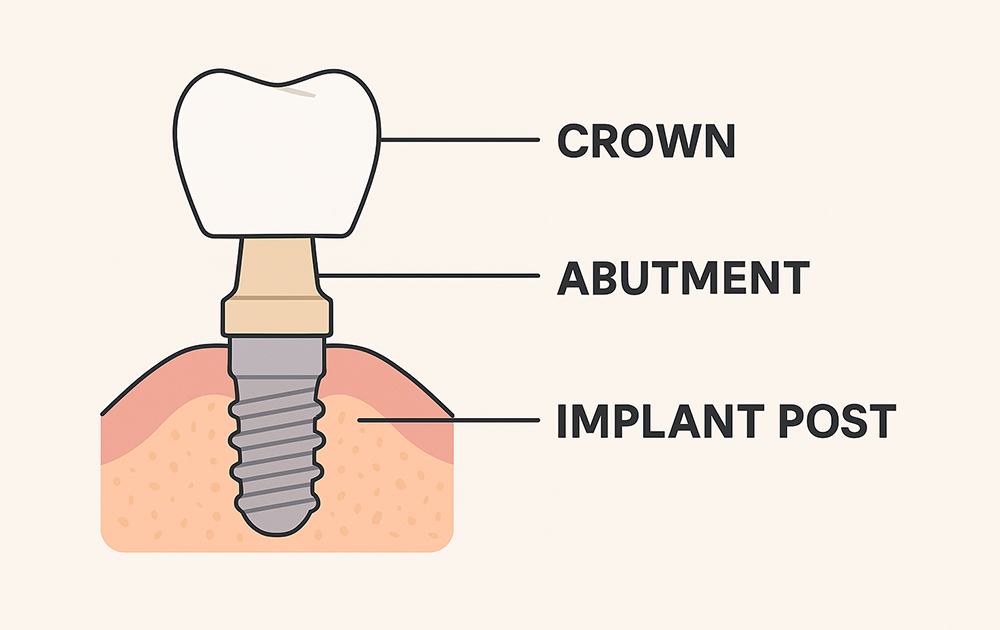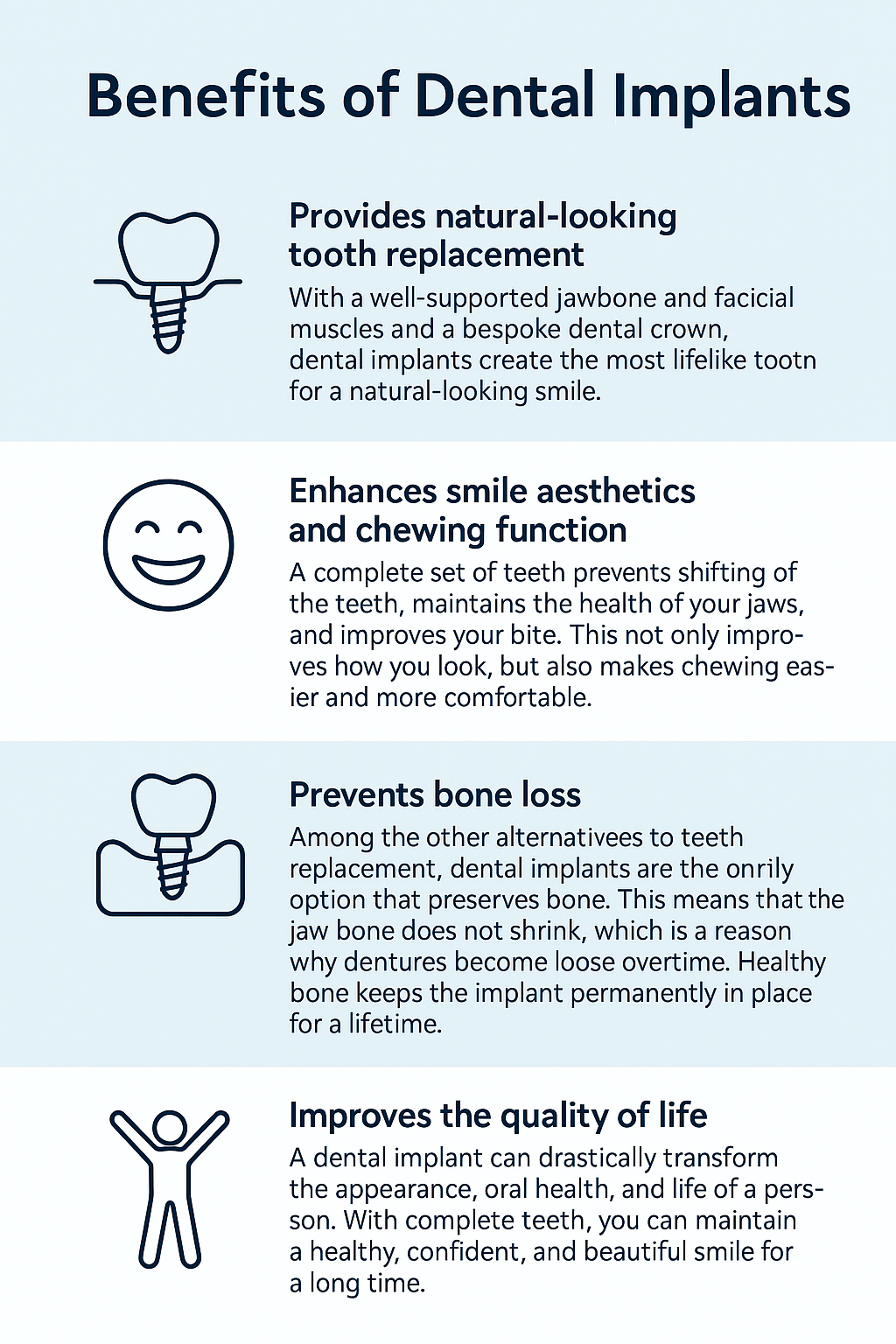Are you missing a tooth and are looking for the most natural-looking way to replace it? If so, our dentists at Arbutus Station Dental recommend scheduling an appointment for dental implants.
Unlike other treatment options to replace a missing or lost tooth, dental implants replace both the tooth and its root. This creates a tooth replacement that looks, feels, and functions the same way as a natural tooth would. Not to mention, dental implants can last you a lifetime with proper care and maintenance, making them an excellent long-term investment.
Want to learn more about dental implants? Here is a short read with its benefits, treatment process, and everything else in between.
What are Dental Implants?

Dental implants are a tooth replacement solution that can replace one tooth or a full set of missing teeth. They are designed to mimic the natural appearance and normal functions of the tooth, making it the closest thing you can get to your real tooth.
A dental implant unit is composed of three parts, the implant post, abutment, and the dental crown. The implant post is usually made of titanium. It is embedded in the jawbone to act as the tooth root, which will support the future dental crown, or the tooth replacement. These two parts are held together by an abutment, which will prevent the crown from shifting around.
Who is a Good Candidate for Dental Implants?
Not all patients are candidates for dental implants. Proper screening is important to avoid complications that may come with placing an implant on a patient who is not eligible for treatment. Ideal dental implant candidates are those who have:
One missing one tooth or a full set of teeth
Dental implants are a versatile solution to missing teeth. It can be a good option if you have just one missing tooth, a few missing teeth across the jaw, or even a full set of missing teeth. Explore your dental implant options.
Healthy gums and jawbone
Implants will rely on healthy gums and jawbone to keep it in place. If these are not in good shape, you may be recommended for gum treatment or bone grafting to improve the conditions of the mouth and prepare you for dental implant procedure.
No smoking habit
Smoking can compromise healing of the implant with the bone causing early implant failure. If you are a smoker, it is advised that you quit cigarette smoking at least two weeks before the treatment.
Good overall health
Patients who have bone disease, uncontrolled diabetes and hypertension, and blood clotting problems are not recommended for implants. Good health is important to prevent any problems that may cause the implant to fail.
Excellent compliance
The process of getting a dental implant can take up to 6 months, with several dental visits required across that time frame. It is important that you are aware and committed to this treatment for ideal and predictable results.
If you are unable to meet the criteria, our team at Arbutus Station Dental will be happy to discuss other tooth replacement alternatives to improve your smile.
Dental Implants vs. Dentures vs. Bridges
| Feature | Dental Implants | Dentures | Dental Bridges |
|---|---|---|---|
| Appearance | Most natural-looking and feeling | Can appear artificial | Natural-looking, but may not match implants |
| Functionality | Functions like a real tooth | Less stable, may shift while eating or speaking | Good function, but not as strong as implants |
| Longevity | Can last 20+ years or a lifetime | 5–8 years with good care | 10–15 years with good care |
| Bone Preservation | Preserves jawbone structure | Does not prevent bone loss | Minimal bone preservation |
| Comfort | Fixed in place, no slippage | May cause irritation or soreness | Fixed, but may stress adjacent teeth |
| Maintenance | Brush and floss like natural teeth | Requires daily removal and cleaning | Clean under bridge, floss with special tools |
| Cost | Highest upfront cost, long-term value | Lowest cost | Moderate cost |
| Eligibility | Requires good bone density and oral health | Suitable for most patients | Requires healthy teeth on either side of the gap |
| Stability | Very stable (integrated with bone) | Can loosen over time | Stable, but relies on other teeth |
The Dental Implant Procedure
The dental implant treatment is different for every patient. But, generally, the process includes four important steps:
Screening, consultation, treatment planning
A thorough assessment of your case will be done using charts, X-rays, and scans. This will also be used to create a bespoke treatment plan that is most suitable to achieve your specific concerns and smile goals.
Dental implant surgery
Then, the implant surgery will proceed usually under local anaesthesia or sedation. But, for patients in need of multiple implants, deeper sedation or general anaesthesia may be recommended. The implant will be surgically placed in the jawbone to permanently fix it in position.
Healing and osseointegration
As the implant heals, the bone will fuse around it in a process called osseointegration. This will take about 4-6 months depending on your recovery process. Make sure to follow your dentist's post-surgical plan to prevent any problems that may affect healing. After osseointegration, you will be called back to the dentist's office so the abutment can be placed and allowed to heal.
Placement of dental crown
When the abutment is ready, you will be fitted for the final tooth restoration. A single implant unit will require one dental crown to effectively replace the missing tooth. But, implants can also be used as support for a dental bridge or dentures if you have more than one missing tooth.
For some patients, additional procedures may be necessary to prepare their mouth for implant treatment. Depending on their individual needs, this may include gum disease treatment, bone grafting, bone augmentation, or sinus lifting. These extra steps are discussed during treatment planning and are vital to long-term dental implant success rate.
Benefits of Dental Implants

As the most modern replacement for missing or lost tooth, dental implants have the following benefits that patients can enjoy:
Provides natural-looking tooth replacement
With a well-supported jawbone and facial muscles and a bespoke dental crown, dental implants create the most lifelike tooth for a natural-looking smile.
Enhances smile aesthetics and chewing function
A complete set of teeth prevents shifting of the teeth, maintains the health of your jaws, and improves your bite. This not only improves how you look, but also makes chewing easier and more comfortable.
Prevents bone loss
Among the other alternatives to teeth replacement, dental implants are the only option that preserves bone. This means that the jaw bone does not shrink, which is a reason why dentures become loose overtime. Healthy bone keeps the implant permanently in place for a lifetime.
Improves the quality of life
A dental implant can drastically transform the appearance, oral health, and life of a person. With complete teeth, you can maintain a healthy, confident, and beautiful smile for a long time.
Dental Implants in Kitsilano
At Arbutus Station Dental, we are home to an experienced dental implant team and cutting-edge technology to create life-changing smiles using dental implants. To schedule an appointment and learn if you are a candidate for the procedure, book an appointment with us today!
After your consultation with our dentist, we will be able to evaluate your smile and help you understand if dental implants are the best choice for you.
